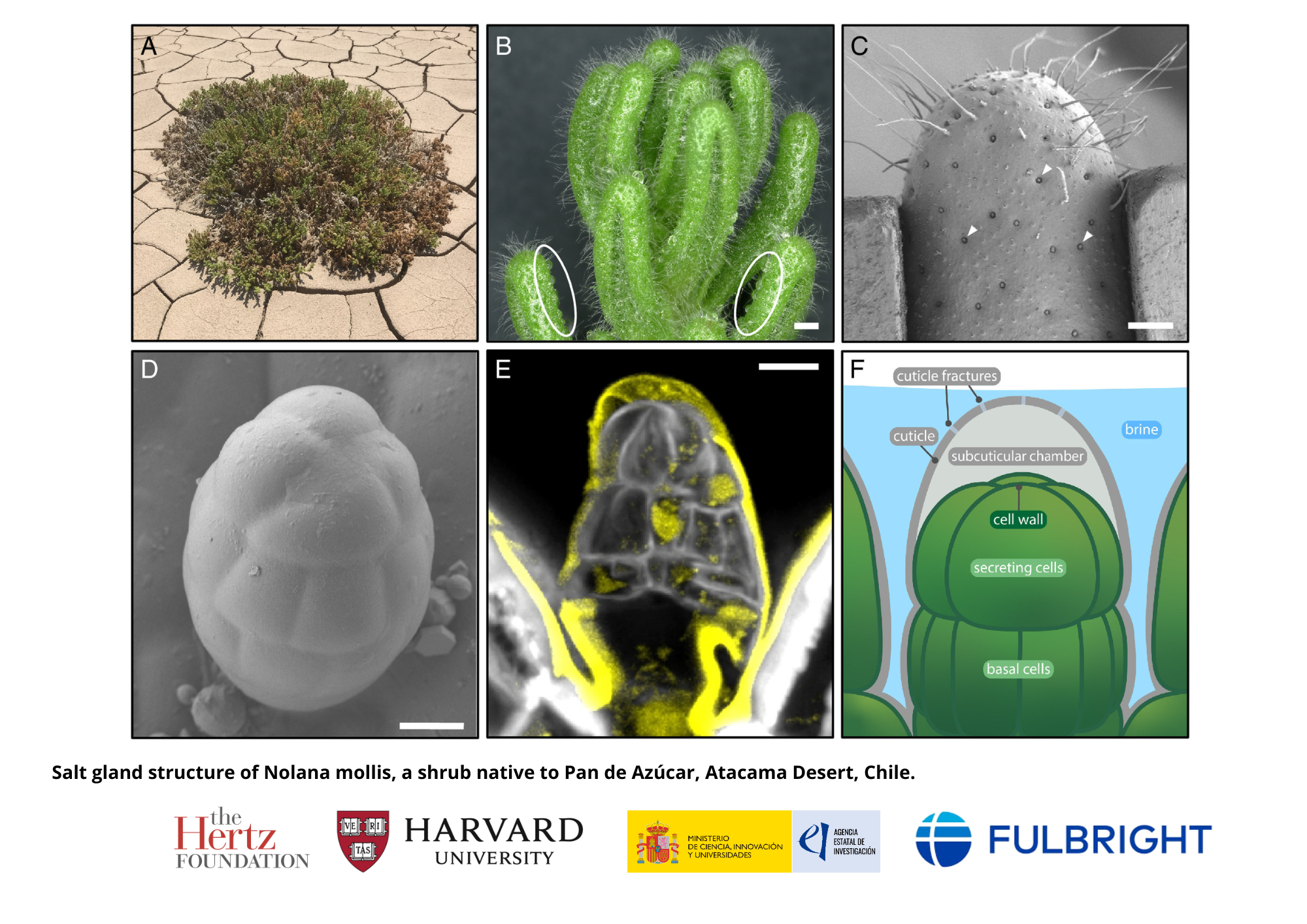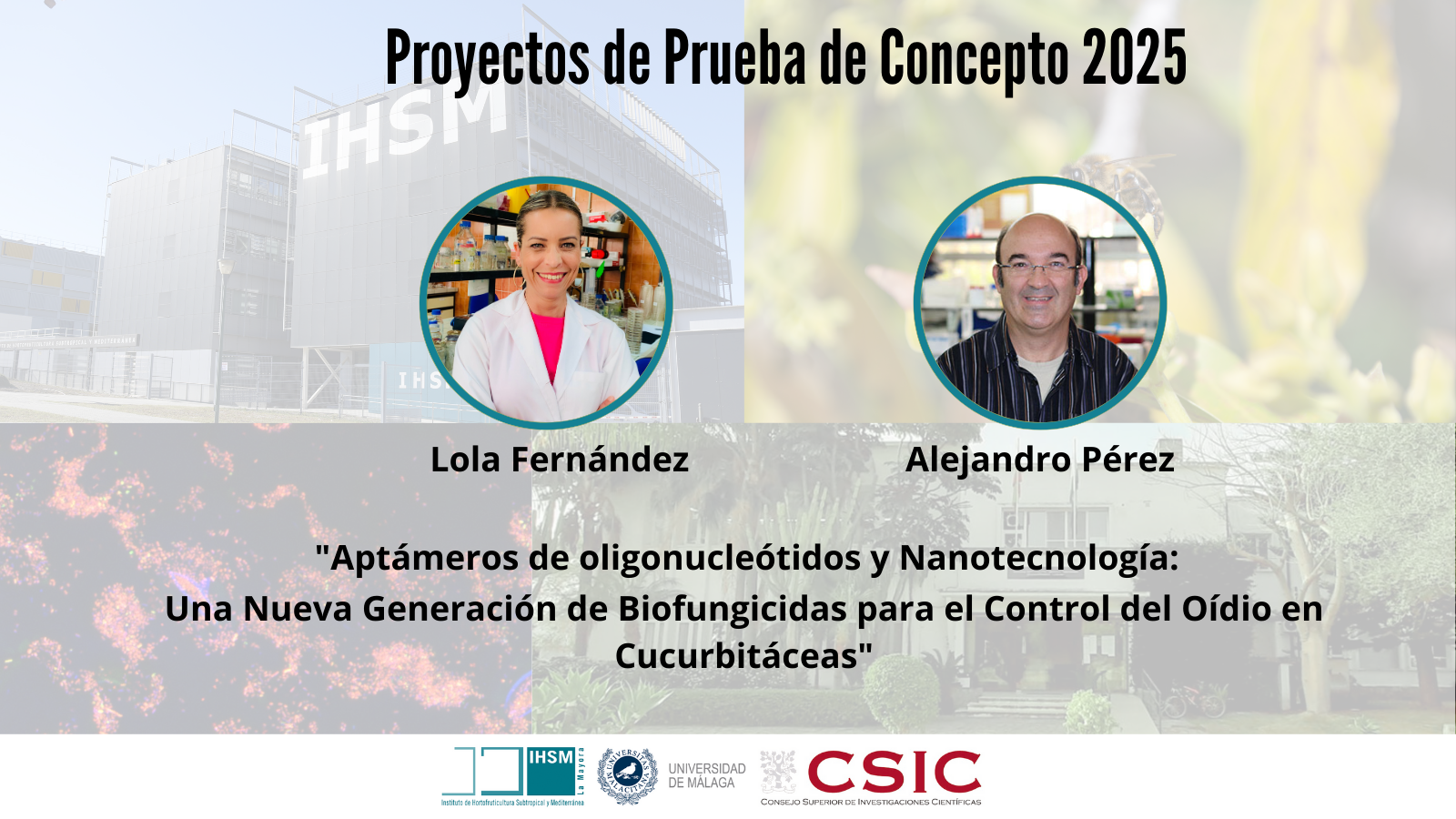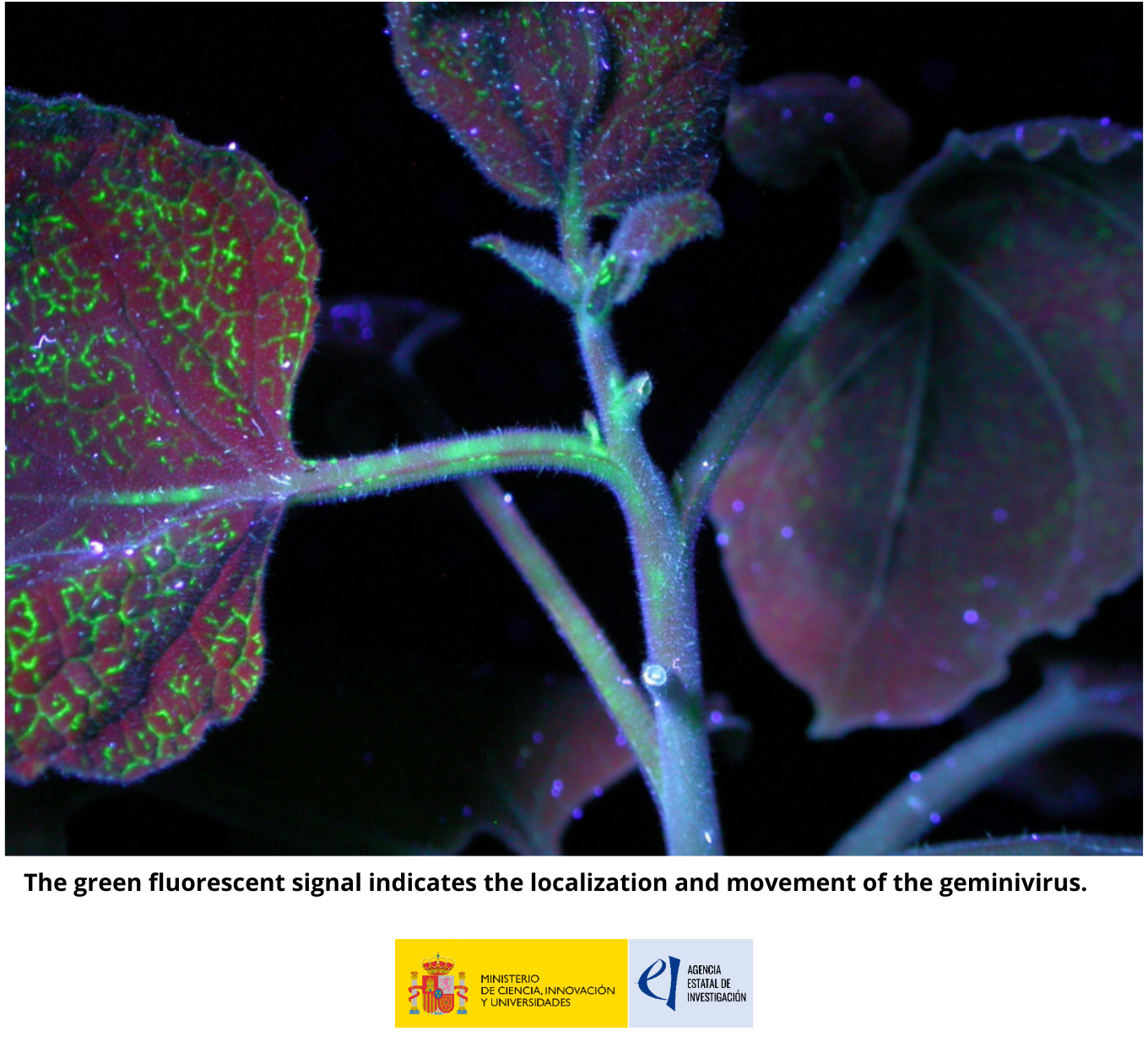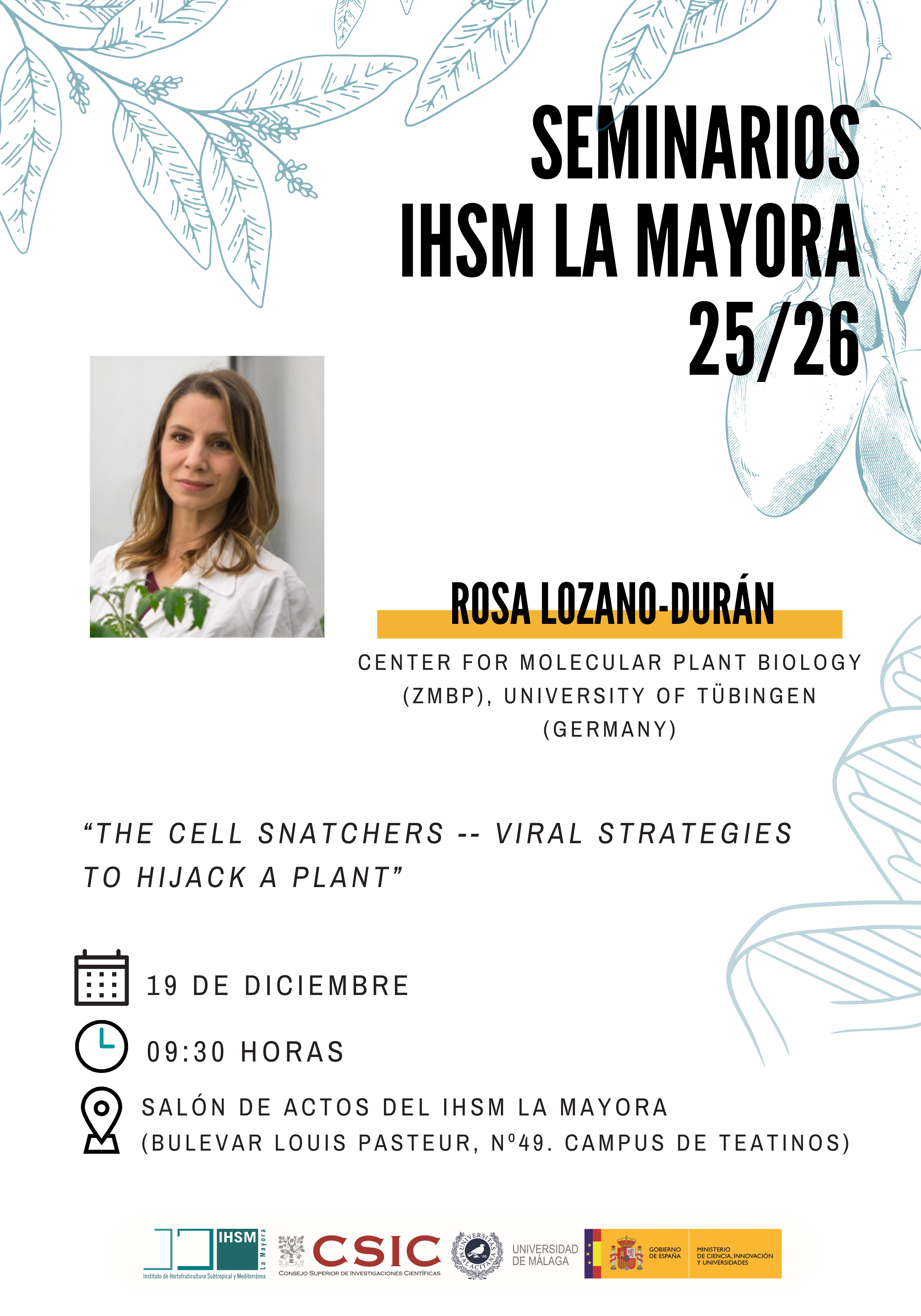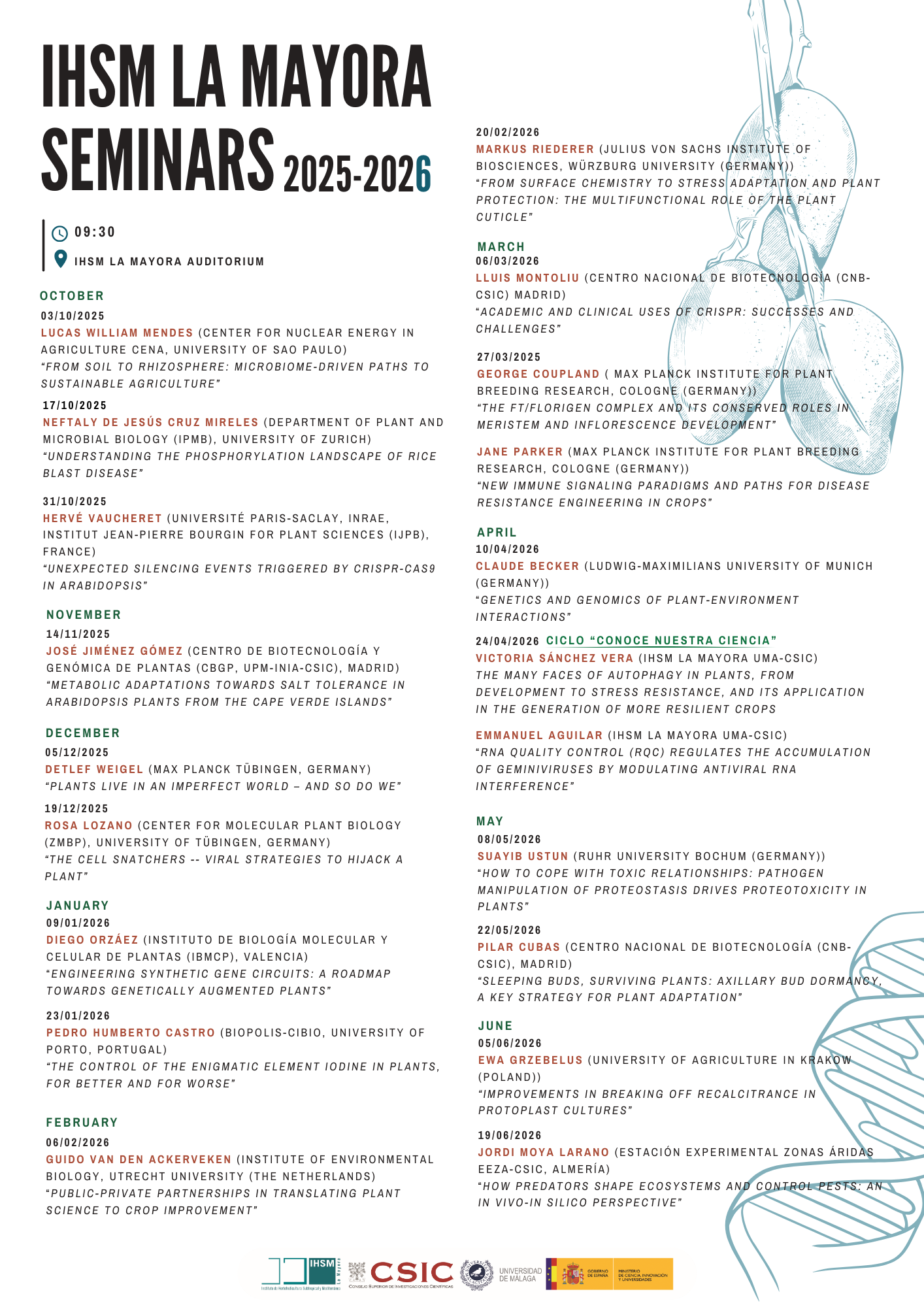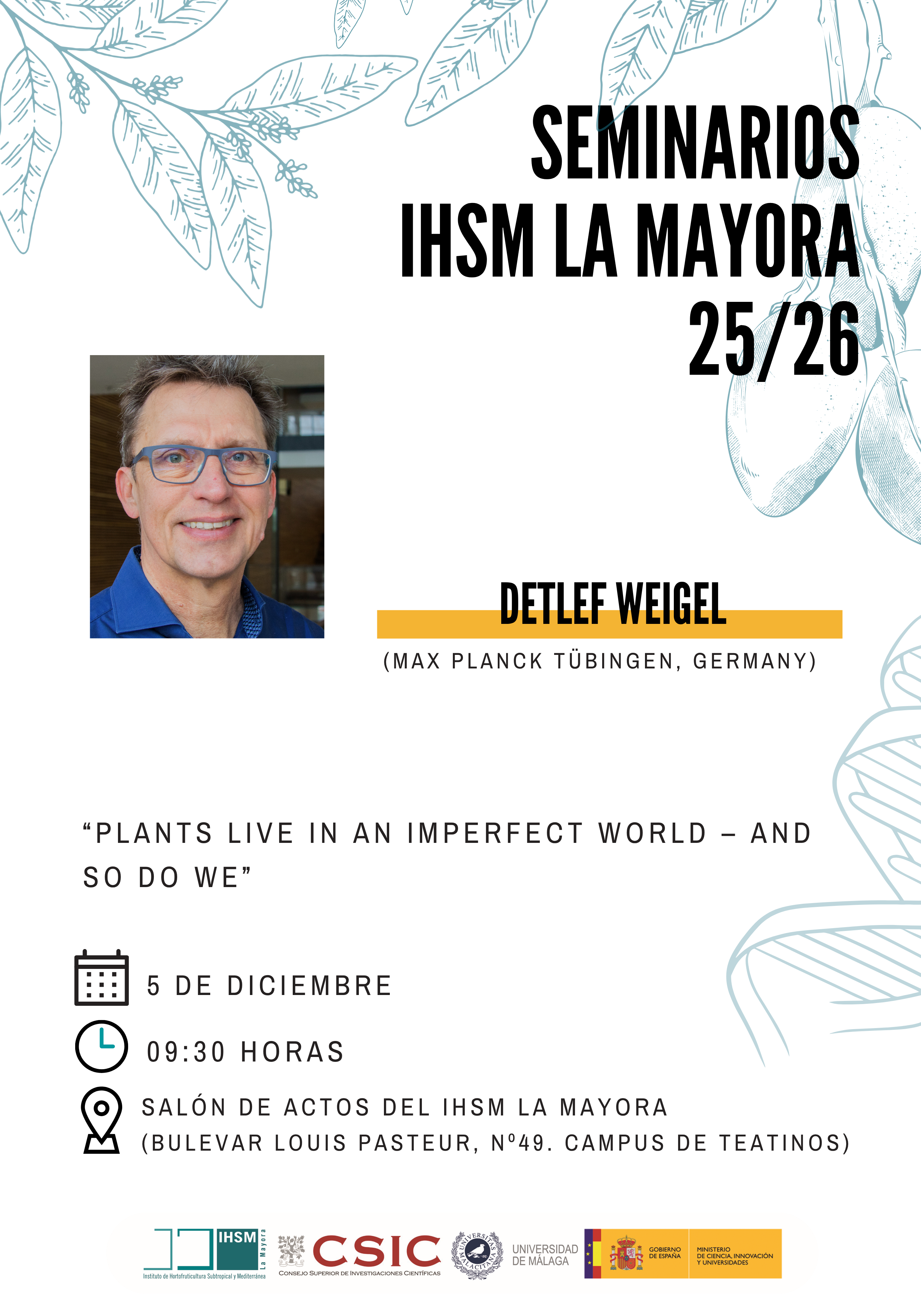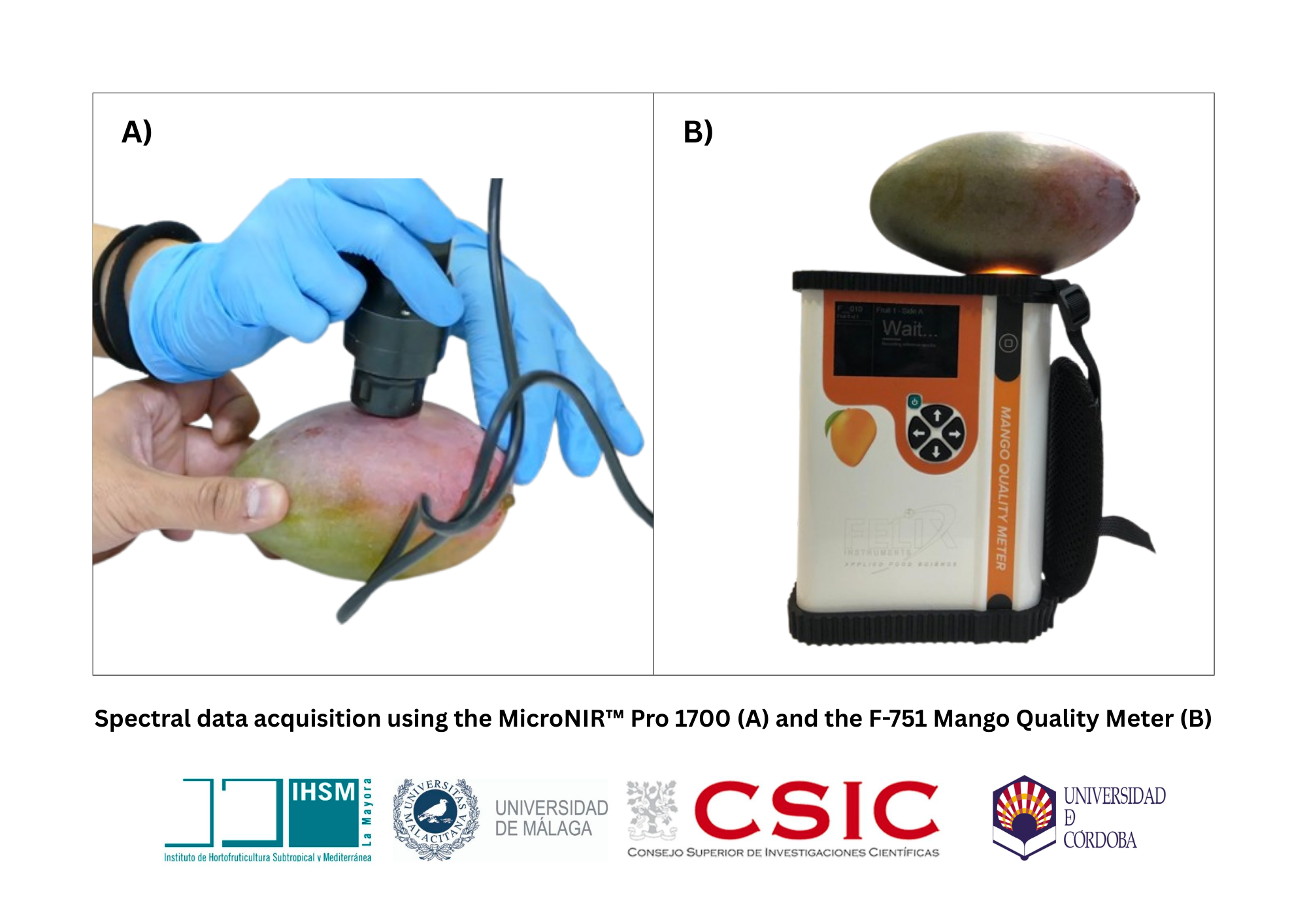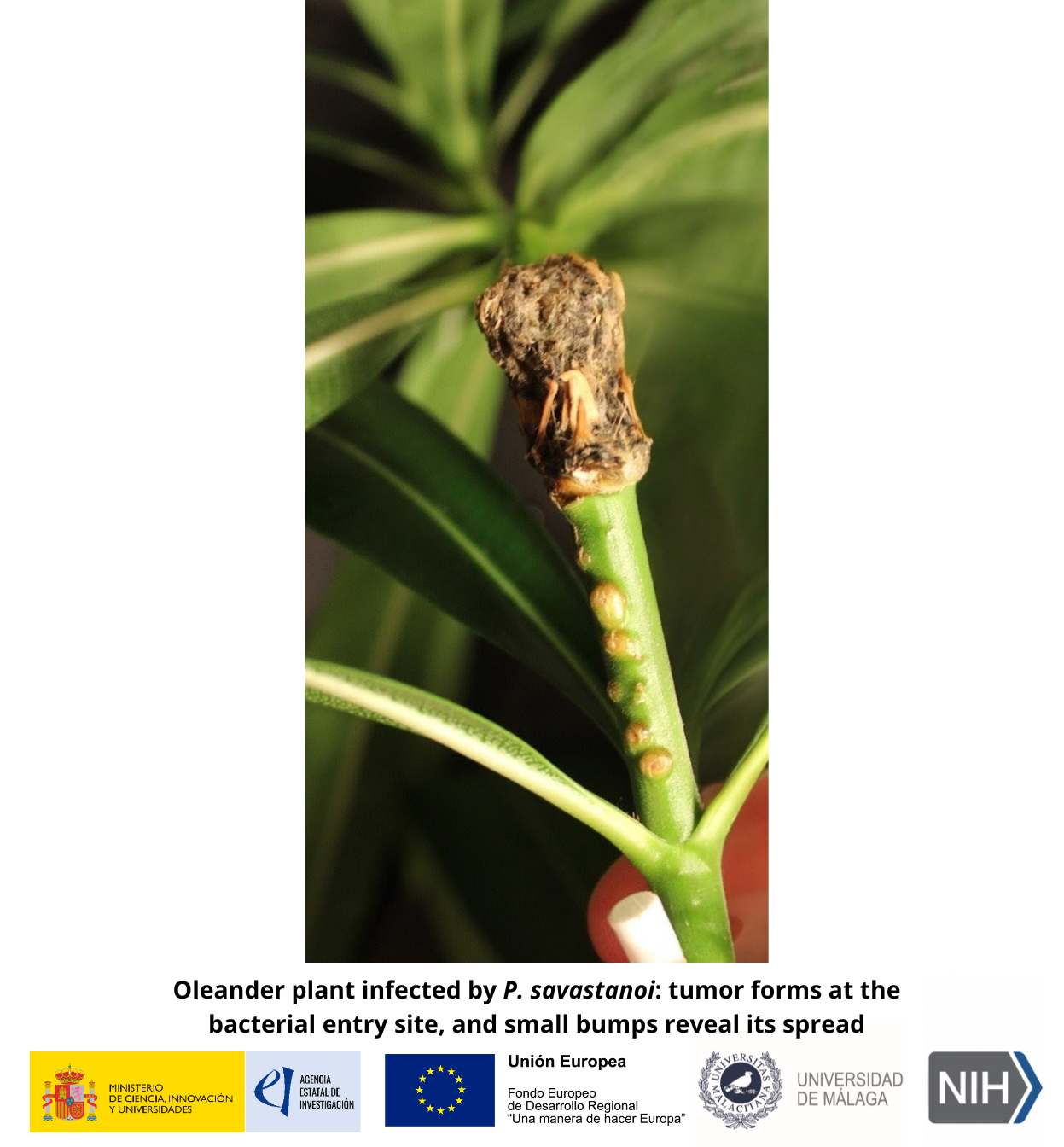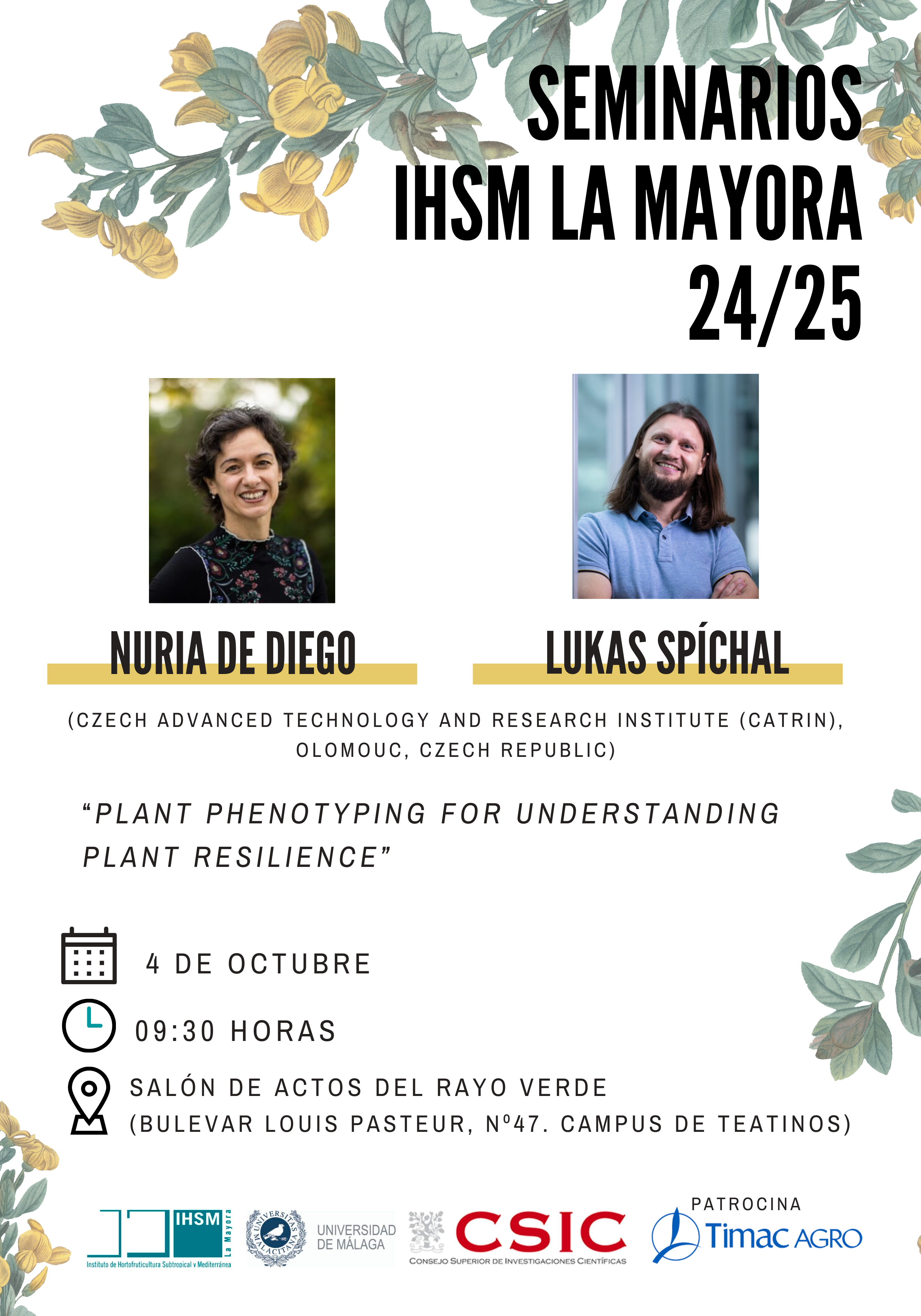
Seminarios IHSM La Mayora - Nuria De Diego y Lukas Spíchal
The research group, Plant-Environment Interactions at Czech Advanced Technology and Research Institute (CATRIN), aims to develop and apply advanced, non-invasive image-based phenotyping techniques to monitor plant-environment interactions. Our high-throughput phenotyping methods utilize model plants for complex testing across wide concentration ranges in varied environmental conditions, aiding in identifying and understanding potential markers. We established a Multi-Trait High-Throughput Screening pipeline capable of assessing tens of thousands of variants per run, using RGB imaging of Arabidopsis to analyze chemical libraries, biostimulants, and genotypes under controlled conditions (Ugena et al., 2018). The variants tested include a mix of chemical concentrations, genotypes, and both abiotic (e.g., water and nutrient limitations, salinity, heavy metals) and biotic stresses (e.g., Botrytis, Pseudomonas), applied via seed/seedling priming or root absorption. Automated software processes the images using a neural network-based plant recognition algorithm to quantify growth dynamics and stress responses. Follow-up large-scale bioassays evaluate certain crops under normal and stressful conditions, focusing on traits like seedling emergence and stress response. Additionally, selected treatments or genotypes are subjected to detailed high-precission phenotyping with various non-invasive sensors to analyze their effects on plant morphology and physiology (Marchetti et al., 2019; Blicharz et al., 2021). We have also introduced "AI-PlantLab," a state-of-the-art tool that leverages artificial intelligence to monitor and predict plant phenotypic traits. This tool combines machine learning processes like object detection and time series prediction with a comprehensive validation of results, making it a pivotal advancement in AI-powered plant phenotyping and digital agriculture. AI-PlantLab’s flexibility allows it to be adapted easily to different plant species and growth conditions, enhancing plant growth monitoring and prediction and establishing new benchmarks for technology-enabled crop production. References Ugena et al. (2018). Front. Plant Sci. https://doi.org/10.3389/fpls.2018.01327 Marchetti et al. (2019). Front. Plant Sci. https://doi.org/10.3389/fpls.2019.01252 Blicharz et al. (2021). Plant J. https://doi.org/10.1111/tpj.15240 BIOGRAPHY OF NURIA DE DIEGO As sessile organisms, plants have developed various strategies to cope with the adverse conditions surrounding them. These environmental conditions include a mix of biotic and abiotic stressors that often act simultaneously and can induce opposing plant reactions. Our group is dedicated to understanding plants’ diverse strategies following their morphological, physiological, and biochemical responses to navigate these complex conditions, aiming to improve resistance and reduce yield losses. Our group boasts the state-of-the-art (semi)automated plant phenotyping facility Olophen, which allows us to study thousands of plants in a single run under combined stress conditions using non-invasive imaging-based approaches. Additionally, we operate a phytochemical analysis facility for quantifying a wide range of primary and secondary metabolites. Combined with our phenotyping data, this information provides a comprehensive view of plant resistance mechanisms to both abiotic and biotic stresses. Both facilities support our own and collaborative research with academic and industrial partners. We are actively involved in various European and national projects to develop new technologies for rapidly analyzing the morphological and physiological traits of plants under different stress conditions using various sensors. Our efforts include development of affordable in-house phenotyping systems, as well as software and hardware solutions to address specific bottlenecks of phenotyping pipeline, including data analysis and processing following FAIR principles. Recently, we have integrated artificial intelligence and machine learning approaches to enhance our pipeline further. Our research covers topics ranging from fundamental to applied research and extends beyond model plants such as Arabidopsis, barley, and maize. We also focus on other agronomically important species in collaboration with our global collaboration network that specializes in specific crops and related challenges connected to plant protection and human health. These crops include potato, rapeseed, and cannabis, among others. Through these multifaceted efforts, our group aims to advance plant science and develop resilient crops capable of withstanding environmental challenges. These contributions support the Sustainable Development Goals (SDGs), including climate action, life on land, and zero hunger. BIOGRAPHY OF LUKAS SPICHAL MSc. in biology and chemistry, high-school teaching program Palacký University Olomouc 2002; Ph.D. in Biology at Palacký University in Olomouc 2005; in total 1.5 years of research stays at Free University, Berlin, Germany (2002-2012). Since 2010, Lukáš Spíchal has worked as senior researcher at the Centre of the Region Haná for Biotechnological and Agricultural Research, where, since 2021, he has been a leader of the Phenotyping research group within the Czech Advanced Technology and Research Institute (CATRIN). He also worked as a group leader at the Laboratory of Growth Regulators, Faculty of Science UP Olomouc and the Institute of Experimental Botany AS CR (2005–2019). He was a member of the Advisory Board of the Institute of Experimental Botany, AS CR (2012-2016). In 2012, he was awarded a prize “The best R&D team competition“ at the international Bioforum, Brno, Czech Republic. His scientific interest covers chemical biology of plant hormones, development of agrochemicals and technologies for plant growth regulation, high-throughput bioassaying and automated plant phenotyping (WoS: >110 publications, > 3500 citations, h-index 34, > 30 granted patents, three of which licensed to commercial entities, including multinationals). In 2022, his name featured on the list of Highly Cited Researchers™ by Clarivate. So far, he has supervised 4 Ph.D., 5 master’s, and 4 bachelor’s students, taught a course in general biology and given field seminars at the Faculty of Science. Lukáš Spíchal has been the main applicant and co-applicant of four national grants for basic and applied research (GAČR and TAČR, > 50 mil. CZK). He was a leader of research programs of OP VVV projects “Excellent Research” and “ITI”. In 2017 he founded the Czech Plant Phentyping network (CzPPN). He is its coordinator and a Czech representative in Support Group of ESFRI project EMPHASIS. He was also a member of the Technical Commission CEN/TC 455 “Plant Biostimulants“ at the European Standardization Committee (CEN). In 2011, he co-founded a spin-off company AgroBioChem, s.r.o., closely collaborating with Palacký University in research and development of new technologies and products for regulation of plant growth and development.

